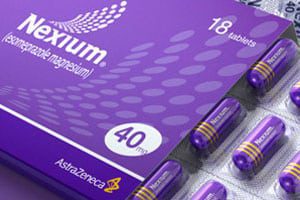
Some popular acid reflux drugs such as Prilosec (omeprazole), Nexium (esomeprazole magnesium), and Prevacid (lansoprazole), may increase risks for heart disease and heart attack, according to an emerging report by the American Heart Association. The report notes that while the drugs may suppress stomach acids, they may also lead to blood vessel constriction, which reduces […]
 Some popular acid reflux drugs such as Prilosec (omeprazole), Nexium (esomeprazole magnesium), and Prevacid (lansoprazole), may increase risks for heart disease and heart attack, according to an emerging report by the American Heart Association.
Some popular acid reflux drugs such as Prilosec (omeprazole), Nexium (esomeprazole magnesium), and Prevacid (lansoprazole), may increase risks for heart disease and heart attack, according to an emerging report by the American Heart Association.
The report notes that while the drugs may suppress stomach acids, they may also lead to blood vessel constriction, which reduces blood flow, according to Forbes. Study lead, John P. Cooke, clinical professor and chair of the department of cardiovascular sciences at Houston Methodist Hospital, published his findings in the current issue of Circulation, the journal of the American Heart Association.
Drugs such as Prilosec, Nexium, and Prevacid are in the drug class known as protein pump inhibitors (PPIs) and, in lab studies, were associated with a 25 percent increase in a compound known to be a cardiovascular risk, according to NewsMax. PPIs are expected to have the same reactions in humans, according to the research
Cooke and his team continue their research in the hopes of strengthening these conclusions, according to NewsMax. “There’s going to be more information coming out that will, in my opinion, raise concerns about the long-term effects of proton pump inhibitors and risk of heart damage,” Cooke told Forbes.
According to Cooke, patients with a family history of heart disease or other risk factors, should consider avoiding PPIs. “I’d tell people, if there’s something else they could be taking that would effectively control their symptoms … maybe that would be better,” he told Forbes.
Prior research suggests that PPIs can lead to pneumonia and intestinal infections, according to Consumer Reports.
We previously wrote that prior research revealed that PPI use can increase the likelihood that a person will develop Clostridium difficile-associated diarrhea. That study appeared in the American Journal of Gastroenterology; the researchers asserted that the use of PPIs to treat gastric ulcers should be approached more carefully.
C. difficile-associated diarrhea is a severe form of diarrhea caused by C. difficile bacteria. Illness from C. difficile most commonly affects older adults in hospitals or in long-term care facilities, and typically occurs after use of antibiotic medications.
PPIs treat conditions such as gastroesophageal reflux disease (GERD), stomach and small intestine ulcers, and inflammation of the esophagus. Versions sold over-the-counter are used to treat frequent heartburn.
Other possible side effects linked to the long-term use of PPIs include fractures of the hip, wrist, and spine. Taking the drugs for too long may also cause hypomagnesaemia, an electrolyte disturbance in which there is an abnormally low level of magnesium in the blood that can result in dizziness, fatigue, convulsions, and heart rhythm problems.


